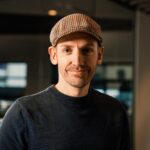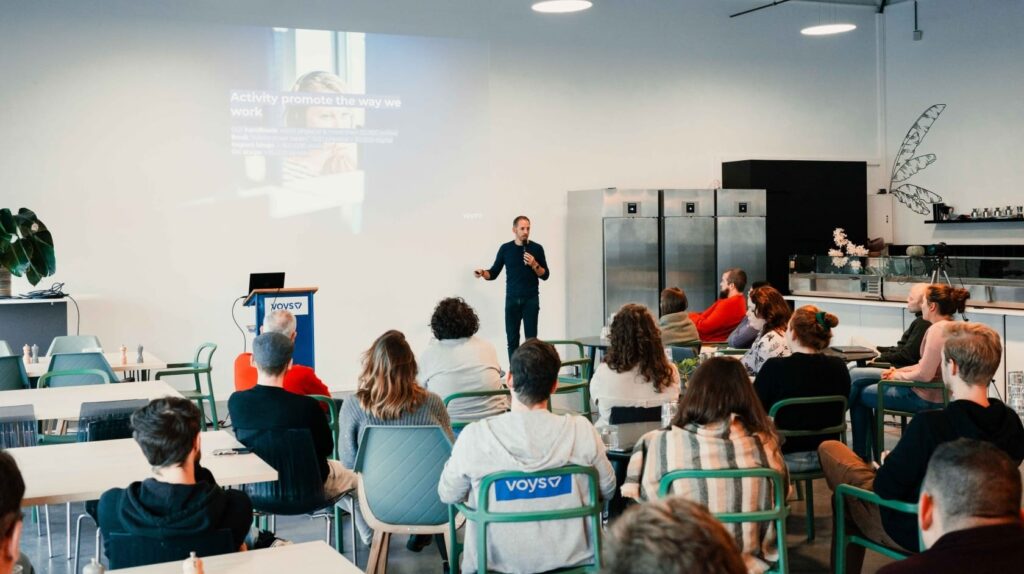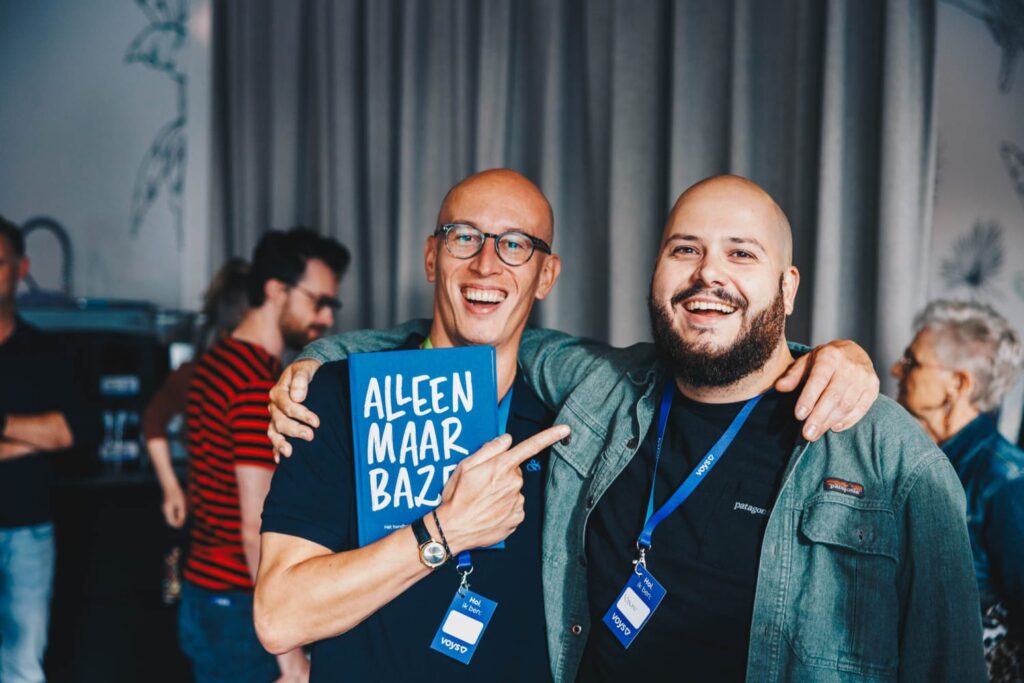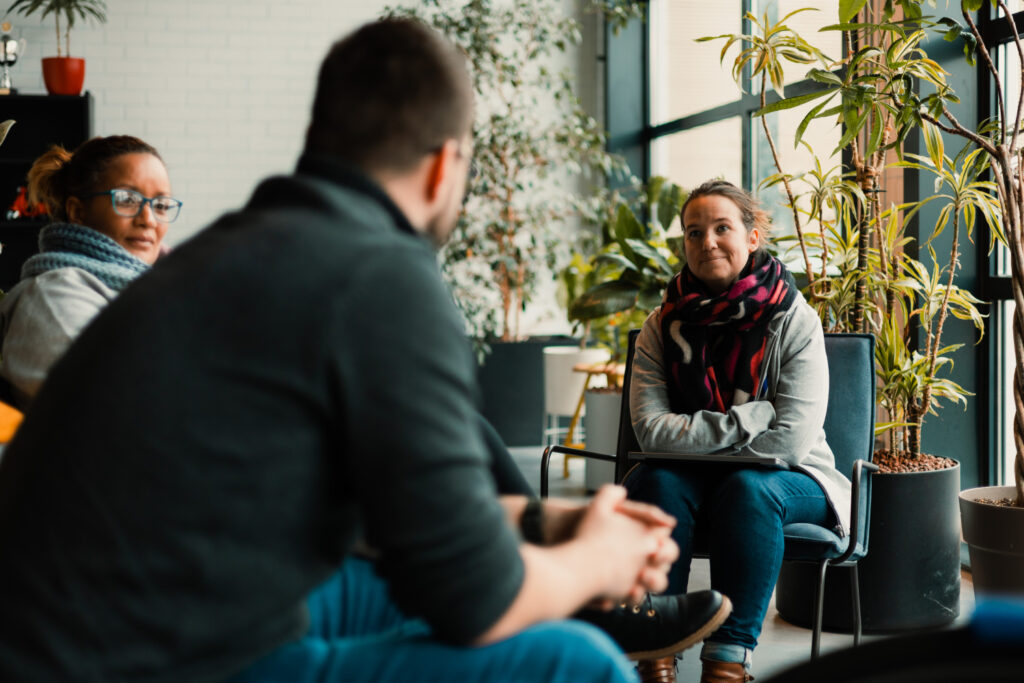I’m giving away my multi-million dollar company and this is why
In this blog, Voys-founder Mark Vletter explains why he is giving away a large part of his company and how he approaches it.


Do you like reading Mark’s stories? Sign up to his monthly newsletter full of stories that will help you and your company grow.
Next year it will be exactly 20 years since I started Voys as a project at TNO. I should therefore have every reason to look back at it with pride and nostalgia, but honestly? I rather want to look towards the future. Because our world faces huge challenges: economically, ecologically, and socially.
In this blog, I’ll tell you why I’m giving away large parts of my company and how I approach this. Spoiler: a golden ticket in your chocolate bar is not the answer.
(It’s way better!)
We accidentally built one of the first cloud telephone platforms in the world
For the context it’s useful that I quickly sketch Voys’ story for you. Now you’re probably expecting a brilliant business idea, which started with the vision of Voys. The real story is rather different.
I wrote my thesis at TNO, a research institute in the Netherlands. There, together with three other young blokes, I had the opportunity to play around with the future of internet technology. We developed an online telephone platform for ourselves. That way we would be easily reachable by telephone to the 5.000 people that worked in that organization.
Looking back, we had built one of the first cloud telephone platforms in the world, but we only realized this several years later. The fact that that would be the start of the multi-million dollar company was something nobody believed, because who starts a telecom provider in the student dorm room?
I’m the owner on paper, but a colleague at heart
Voys was our way to prove that the technology that we had developed worked. And also that there was a market for it. That grew to the amazing company that Voys is today, and I am extremely proud of it.
However, I didn’t build the company myself. That happened with a large group of (previous) colleagues who worked hard together to change the world of telecommunications. On paper I’m the owner, but I know very well that Voys wouldn’t have been where it is today if it weren’t for these people. The ownership of Voys is therefore more broadly based, and that is also what feels right to me.

Equal collaboration 2.0
To those who have followed us for a longer time, know that we work without managers. For me, power detracts from the equal way I want to work with colleagues. Self-management is therefore an important part of our identity. The freedom and responsibility that colleagues have to fulfill their roles shapes who we are and how we look at the world.
Because we work without managers at Voys, everyone contributes to further build the company. Additionally, everyone is responsible for the continuous growth of the company. That responsibility is therefore something I share with others. This means that the heavy weight of entrepreneurship doesn’t exclusively rest on my shoulders.
The balance between risk and reward is currently not fair
The right to exists is thanks to:
- Our customers, who trust us and choose to pay for our services on a monthly basis.
- Our colleagues, who each contribute with their expertise to grow our business.
- The Dutch infrastructure on which we have built our company.
- The innovation of TNO, who gave us room to learn and experiment.
All these factors contributed to the fact that Voys currently is a multi-million dollar company.
That’s when the question arises: is it fair that I, as the owner, claim all the economic benefits that flow from Voys. I don’t think so. It is time for the next step: we want to share the value of Voys in a fairer way.
Contributing to a positive impact on the world
With Voys, we want to make a positive impact on the world. Earning money is not a direct goal, but a result. It is simply also necessary to keep growing a successful company. The result comes from a good product that has value for our customers.
We often do things slightly differently than others. That’s why a new type of ownership fits well.
- We built a new online telephone portal when nobody did.
- We started with self-management when having managers was the norm.
- We always worked based on our values, such as privacy, equality and freedom, even if it required us to take a risk.
If you consider the red thread in this story, giving away large parts of my multi-million dollar company makes a lot of sense.

Why turning to the stock market is not an option
Taking your company to the stock market is a logical step for many large companies. But that is not what we’re going to do. It doesn’t fit with the way we imagine ownership in the future.
As soon as you go to the stock market, others will become owners of your company. Those others often look at one thing: economic value (and the increase thereof). Voys is worth so much more than just economic value.
With our foundation 48percent.org we do our best to close the digital divide, ensuring that everyone has access to the internet, and in this way have equitable opportunities for education, work, and welfare.
We provide work opportunities, contribute a lot to the education of the coming generations, we give a lot of our product back to the world by making it open source, we experiment with better ways to manage the company, and we wrote an amazing book and hand book, to mention a few examples.
Through these initiatives, Voys has a high level of social value. Making an impact is the most important thing for us, and we can do that without shareholders who make demands for our growth and impose consequences.
Securing Voys’ mission for the future
So, we are going to distribute the power and millions within Voys in a better way, but without shareholders. The most important thing for me is to secure the mission of Voys for the future.
This way we can make a real impact on the world in the long run. That is only possible if we think beyond profit.
Together, we have built a system that creates economic value at the expense of people and the planet, and that needs to change if we want to move forward.
A few facts:
- The Netherlands is one of the richest countries in the world, but poverty is increasing and affects nearly 1 million people in the country.
- The richest 1% of the world have in the duration of the last two years doubled their wealth in comparison to the combined rest of the world.
- Our climate is radically changing, seeing the loss of biodiversity, depletion of natural resources, droughts, wildfires, heatwaves resulting in lower crop yields.
These are cases that we cannot allow ourselves to ignore, and which we as a company need to take responsibility for. But it seems like the default outcome of our current system of ownership focuses mostly on economic shareholder value. We will therefore need to experiment with new forms of ownership wherein de economic impetus is taken out of the governing system.

This is how I will give my multi-million dollar company away – through Steward Ownership
For a longer time we have been looking into alternatives for ownership which fit with a new economy that secures our mission and values in the future.
We found that in steward ownership, an ownership system that fits our vision of the future, ownership, and the way we handle power and millions.
Looking at our ideal future, seven points emerged that a new system of ownership must meet.
- The system needs to differentiate between and split up governing rights and economic rights. If you merge these, you’ll create unhealthy power imbalances in the system.
- The system needs to be both robust and future-proof. This means that any arrangements and decisions that have been made, that seem very good now, can be adjusted at a later stage if necessary.
- The philosophy of the company – the reason for existence and its values must be safeguarded.
- Colleagues, customers, and our philosophy need to have one voice when it comes to the further development of the company.
- The organization must stay self-managing.
- The transfer must be affordable, which sounds logical, but is complex within Dutch laws and regulations.
- The system needs to be transparent.
Discover how steward ownership works
The way we intend to interpret steward ownership divides the power and economic value of my company equitably, now and in the future. It is a great solution for Voys because both colleagues, our customers, and our ideology are represented in the system and have a voice. Thus, all interests that matter are safeguarded by a foundation that takes care of governance.
Curious about how that works?
In the next blog, I’ll explain exactly what steward ownership is, how you can apply it in your organization, and which steps we are currently taking at Voys.
More stories to read
On our blog we post about a lot of stuff, just go for it and read some posts for your own fun.

from 19 July 2024
How a week-long market in our office drives alignment and future planning
